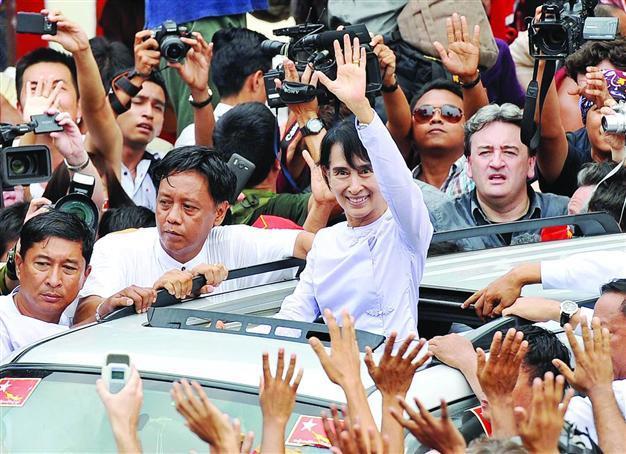Aung San Suu Kyi hails ‘new era’ for Myanmar
YANGON, Myanmar

Myanmar opposition leader Aung San Suu Kyi (C) waves to the crowd as she leaves National League for Democracy headquarters, after addressing supporters in Yangon. The former junta had kept her imprisoned in her lakeside home for two decades. AFP photo
Pro-democracy leader Aung San Suu Kyi claimed victory yesterday in Myanmar’s historic by-election, saying she hoped it would mark the beginning of a new era for the long-repressed country.Suu Kyi’s supporters celebrated into the night after her National League for Democracy Party (NLD) declared victory in the April 1 election. “This is not so much our triumph as a triumph for people who have decided that they must be involved in the political process in this country,” Suu Kyi said in a victory speech at her party headquarters in Yangon. “We hope this will be the beginning of a new era,” said the activist, who was locked up by the former junta for most of the past 22 years.
The charismatic Suu Kyi, a Nobel Peace Prize laureate who led the struggle against military rule in the former Burma for two decades, was one of 44 candidates NLD said won all but one of the legislative seats being contested.
The by-elections followed a year of astonishing change for a country that was in the grip of military rule for decades: The government has freed hundreds of political prisoners, held talks with ethnic minority rebels, relaxed censorship, allowed trade unions, and shows signs of pulling back from the economic and political orbit of neighbor China.
Praise from US, EU and ASEAN
The former junta had kept Suu Kyi imprisoned in her lakeside home for the better part of two decades. When she was finally released in late 2010, just after a general election that was deemed by most neither free nor fair, few could have imagined she would so quickly make the leap from democracy advocate to elected official, opening the way for a potential presidential run in 2015.
But Myanmar has changed dramatically in that time. The junta finally ceded power last year, and although many of its leaders merely swapped their military uniforms for civilian suits, they went on to stun even their staunchest critics by releasing political prisoners, signing cease-fires with rebels, relaxing press censorship and opening a direct dialogue with Suu Kyi, who was awarded the Nobel Peace Prize in 1991 while under house arrest.
Unlike in the 2010 general elections, the government allowed foreign observers and journalists to witness the polling, which was held to replace MPs who gave up their seats to join the government.
The United States and European Union had hinted they could lift some sanctions -- imposed over the past two decades in response to human rights abuses -- if the election was free and fair. U.S.
Secretary of State Hillary Clinton congratulated Myanmar for holding the poll. Speaking at a news conference in Istanbul, she said Washington is committed to supporting the country’s reform effort.
Malgorzata Wasilewska, an E.U. election observer, hailed “very encouraging” signs at the roughly dozen polling stations her team visited. Asian foreign ministers also welcomed Myanmar’s “orderly” elections.
Compiled from AP, AFP, and Reuters stories by the Daily News staff.
New currency regime starts
YANGON-Agence France-Presse
Myanmar yesterday began a managed flotation of its currency, overhauling its complex exchange rate system in the new government’s most radical economic reform yet. The central bank set a reference rate of 818 kyat to the dollar, according to an announcement on its website. The move brings the official currency rate in line with its value on the black market of about 800 to the greenback. The move is part of burgeoning reforms to modernize an economy left in disarray by decades of military rule and isolation. Announcing the move last week, the central bank said the managed floating exchange rate would allow market forces to determine the value of the kyat while leaving room for it to influence the unit’s value. Analysts said the simplified currency regime would help facilitate trade and investment as Myanmar gradually opens up. Following the end of almost half a century of junta rule last year, the country formerly known as Burma now has a nominally civilian government whose ranks are filled with ex-generals. The new regime has surprised even its critics with a series of reforms, and the currency revamp is its first major move to modernize an economy weakened by decades of mismanagement and international sanctions.
















